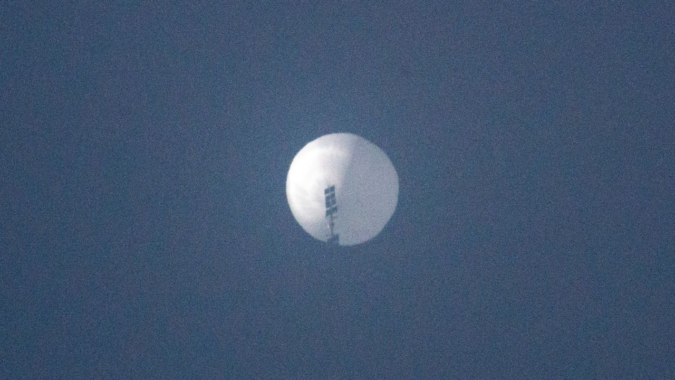US officials said Thursday that the military has been tracking the spy balloon for several days and has even considered shooting it down, but a decision on this has been deferred in the interest of public safety.
The balloon is traveling at an altitude well above commercial air traffic, and in its current state, it “does not present a military or physical threat to people on the ground,” officials said.
The disclosure, coming just days before Secretary of State Antony Blinken is due to visit Beijing, threatens to aggravate an already fraught relationship between the two countries.
Chinese infiltration of US on the ground and now in the air has stirred disquiet in both strategic and political circles. US lawmakers and military analysts have been warning about proposed Chinese land purchases in neighboring North Dakota, saying it could be cover for spying on a nearby military facility where drone test flights are conducted.
Some US lawmakers and officials, notably Florida governor Ron DeSantis have even suggested Chinese entities should be banned from buying American real estate.
Canada, which also tracked the Chinese spy balloon — and suggested there was a second one — has gone so far as to ban foreigners from buying real estate to cool prices. Chinese homebuyers accounted for nearly one-third of Vancouver’s real estate market in 2015, according to a report by the National Bank of Canada.
America is looking to follow suit.
“We don’t want to have holdings by hostile nations,” DeSantis said last month, revealing that he is considering asking the Florida legislature to ban China from real estate investments.
In Washington, leaders of a House select committee on China, issued a joint statement saying “the Chinese Communist Party should not have on-demand access to American airspace.”
“Not only is this a violation of American sovereignty, coming only days before Secretary Blinken’s trip to China, but it also makes clear that the [Chinese Communist Party’s] recent diplomatic overtures do not represent a substantive change in policy,” lawmakers Mike Gallagher (R) and Raja Krishnamoorthi (D) said, adding the incident demonstrates that the threat posed by China “is not confined to distant shores — it is here at home and we must act to counter this threat.”
President Biden reportedly sought military options after being briefed on the incursion, but was told the Pentagon had acted immediately to prevent collection of sensitive information.
Senior military officers, including Gen. Mark Milley, chairman of the Joint Chiefs of Staff, reportedly advised against shooting down the balloon — said to be the size of three buses — citing concerns that falling debris could put people and property at risk.
In Beijing, Chinese Foreign Ministry spokesperson Mao Ning said China was assessing the situation and that speculation and hype were unhelpful while facts were still being clarified.
“China is a responsible country that always abides by international law and has no intention of infringing on any country’s territory and airspace,” Mao said.
But American officials said the U.S. intelligence community has “very high confidence” the balloon belongs to China, and Washington has engaged with Chinese officials “with urgency, through multiple channels” on the matter.
“We have communicated to them the seriousness with which we take this issue. We have made clear we will do whatever is necessary to protect our people and our homeland,” a senior military general told journalists at a background briefing.
US officials acknowledged China has been undertaking similar activity spanning a period of “several years” mainly over US territories such as Hawaii and Guam in the Pacific.
